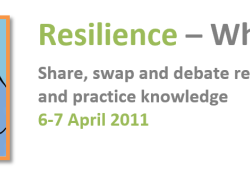Topic: Resilience and social marketing: A socio-ecological approach to behaviour change – Matthew Wood, University of Brighton
Resources: You can download Matthew’s slides.
Summary: Social marketing is the application of commercial marketing approaches (consumer insight research, segmentation, communications, branding etc.) to encourage or enable voluntary behaviour change for individual or social good. For example, Change4Life was developed as part of a national social marketing strategy to address rising levels of obesity amongst young people in the UK. Based on his doctoral research, Matthew argues that resilience – and its underlying socio-ecological perspective – is a critical concept which could serve to integrate different views on, and approaches to, social marketing. From a socio-ecological perspective research findings highlight the impact that macro, meso and micro forces have on behaviour, the importance of a child’s micro-system, and the influence it has on development and life outcomes. The aim is to inspire social marketers to move away from narrow, issue-based interventions targeting individual behaviours, and to consider the impact of social ecologies, particularly the contribution resilience research can make to behaviour change. At the same time, social marketing thinking and approaches have something valuable to offer resilience researchers and practitioners – together they could be a powerful force for social change.
Biography: Matthew Wood is Principal Lecturer in Marketing at Brighton Business School, University of Brighton, and the Marketing Subject Group Leader. He is also Course Leader for the Postgraduate Certificate in Social Marketing programme. Matthew works closely with communications and behaviour change agency The Campaign Company and the charity Drinkaware. He regularly publishes in The Journal of Social Marketing and Social Marketing Quarterly. Matthew recently completed his PhD, which offers a new approach to behaviour change by integrating resilience and social marketing principles. He is a member of the Centre of Resilience for Social Justice research group where he aims to extend his doctoral work.
Who might be most interested: Academics, practitioners, researchers, parents/carers, community workers, volunteers, public sector workers, young people, anybody interested in social marketing.
This event took place on Thursday 10 May 2018.
If you like what you see and you want more, More, MORE, why not subscribe to our mailing list? You’ll receive our email newsletter with details of our upcoming Resilience Forums, training and other events, news and resources (most of which are free!), and any other products and services that might be of interest. This is a web-based service and it is very easy to subscribe, unsubscribe or update your email address at any time.
The Resilience Forum is for ANYBODY (with a pulse!) involved with or interested in resilience research


